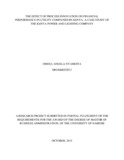| dc.description.abstract | Utility services such as water and electricity are very important resources for a country‟s
economic growth. Utility companies adopt innovations in order to provide better service delivery
to customers, improve revenue collection, improve meter reading, billing accuracy, save
customer and company‟s time and resources, empower customers of any upcoming service
events and for up-scaling for competition purposes by adopting to the ever changing
environment. The main objective of this study was to determine the effect of process innovation
in in utility companies in Kenya. A case study was done on Kenya Power and Lighting Company
on their prepaid service process innovation. Descriptive research design was used in the study.
Secondary data used in this study was from year end 2005 to 2014 for KPLC. Data collected was
analyzed using descriptive and inferential statistics to interpret the data. The regression analysis
model showed that there was a positive correlation coefficient (r) = 0.978 and co-efficient of
determination (r2) = 0.957 and adjusted r of 0.903. The results of r2 implied that the variations of
process innovation, asset structure and debt ratio explained 95.7 % of the variations in KPLC
return on asset. The findings showed a positive statistically significant relationship of 0.013
between sale of electricity, a measure of the prepaid process innovation and financial
performance indicator of return on assets. Customer and sales (kWh) per employee, with 0.727
and 0.599 significance respectively does not affect the financial performance. The asset structure
significantly affects the financial performance negatively with a significance of 0.004. Debt ratio
with significance of 0.522 does not have a significant effect on financial performance of KPLC.
The study recommended that there was need for government to foster innovation among the
utility companies which was turn expected to improve revenue collection, improve utility billing
and accuracy, reduce unnecessary costs and be more competitive in the market. | en_US |

